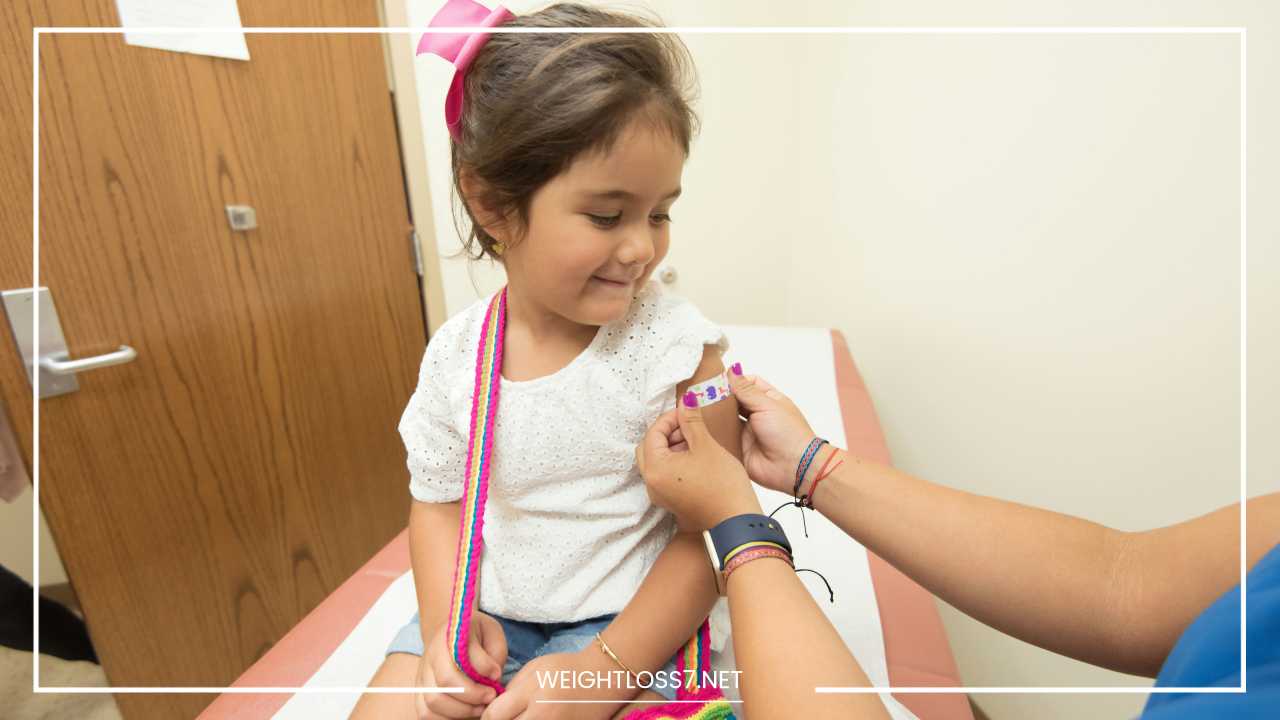Kids Health: Building Healthy Habits for Your Kids

Kids Health
Keeping Your Little Ones Healthy: A Comprehensive Guide to Children’s Well-Being
Our children are the future. Their health and well-being are not just a concern, they’re an investment. But with so much information available, it can be confusing to know where to start.
This comprehensive guide delves into various aspects of children’s health, from the building blocks of a healthy lifestyle to navigating common illnesses and fostering emotional well-being.
Building a Strong Foundation: Nutrition and Exercise
A healthy diet fuels a child’s growth, development, and immune system. It’s the foundation for a healthy life. Here’s how to create a nutritious foundation for your little ones:
- The Rainbow on Their Plate: Make fruits and vegetables the stars of the show. Explore a vibrant variety of colors – red peppers for vitamin C, leafy greens for iron, and sweet potatoes for vitamin A.
- Fiber Fantastic: Include whole grains like brown rice, quinoa, and whole-wheat bread. Fiber keeps them feeling full for longer, aids digestion, and helps regulate blood sugar levels.
- Protein Powerhouses: Lean protein sources like chicken, fish, beans, and lentils are essential for building and repairing tissues, and supporting muscle development.
- Healthy Fats for the Brain: Don’t fear healthy fats! Include avocados, nuts (depending on age and allergies), and olive oil in their diet. These fats are crucial for brain development, cell growth, and nutrient absorption.
- Limit the Sweet Stuff: Sugary drinks and processed foods are low in nutrients and high in calories. Restrict these to occasional treats. Opt for water or milk instead of sugary drinks.
- Make Water Fun: Water is vital for every bodily function. Encourage water intake throughout the day with fun, reusable water bottles and by making water breaks a part of their routine.
Exercise complements a healthy diet. It promotes healthy growth, strengthens bones and muscles, improves cardiovascular health, and boosts mood. Here’s how to get your kids moving:
- Find Activities They Love: Not every kid enjoys running laps. Explore different activities like swimming, dancing, gymnastics, or team sports. Find something they genuinely enjoy to make physical activity a fun and sustainable habit.
- Get Creative with Play: Incorporate movement into everyday activities. Turn chores into a game, play tag in the park, or have dance parties in the living room.
- Lead by Example: Kids learn by watching. Make physical activity a part of your family routine. Go for walks together, bike rides, or have family workout sessions.
- Limit Screen Time: Set clear limits on screen time to encourage physical activity. The American Academy of Pediatrics recommends no screen time for children under 18 months, and limited time for older children.
- Embrace the Outdoors: Schedule regular outdoor playtime whenever possible. Fresh air and sunshine provide vitamin D, essential for bone health, and being in nature can improve mood and cognitive function.
The Power of Sleep: Recharging for Growth
Just like adults, children need adequate sleep for optimal health. Sleep allows their bodies to repair and recharge, and it’s crucial for cognitive development, emotional well-being, and a healthy immune system.
- Age-Appropriate Sleep Needs: Sleep needs vary by age. Newborns need 16-18 hours, while toddlers need 11-14 hours, and school-aged children need 9-12 hours.
- Develop a Consistent Sleep Schedule: Establish a regular bedtime routine and wake-up time, even on weekends. This helps regulate their body’s natural sleep-wake cycle (circadian rhythm).
- Create a Relaxing Bedtime Environment: Ensure their bedroom is dark, quiet, and cool for optimal sleep. Invest in blackout curtains, a white noise machine if needed, and keep the room at a comfortable temperature.
- Calming Activities before Bed: Develop a calming bedtime routine that helps them wind down. This could include taking a warm bath, reading a story together, or listening to calming music.
- Limit Screen Time before Bed: The blue light emitted from electronic devices can interfere with sleep. Avoid screen time for at least an hour before bedtime.
Keeping Kids Safe from Common Illnesses
Childhood illnesses are a fact of life, but there are ways to minimize their frequency and severity. Here’s how to create a shield against common childhood illnesses:
- Vaccinations are Essential: Vaccinations are one of the most effective ways to protect children from serious diseases. Follow the recommended vaccination schedule provided by your pediatrician. It protects not only your child but also those around them who may be more vulnerable.
- Healthy Hygiene Habits: Teach them proper handwashing techniques with soap and water for at least 20 seconds. Encourage covering their coughs and sneezes with a tissue or their elbow (cough etiquette). This simple act can significantly reduce the spread of germs.
- Boosting the Immune System: As mentioned earlier, a balanced diet rich in fruits, vegetables, and whole grains strengthens their immune system to fight off infections. Consider adding a daily multivitamin if recommended by your pediatrician.
- Teach Safe Food Handling: Teach them basic food safety practices like washing hands before handling food, not sharing utensils, and avoiding raw or undercooked foods.
- Doctor as Your Partner: Schedule regular well-child visits with your pediatrician for preventive care and early detection of any potential health issues. These visits allow your pediatrician to monitor growth and development, update vaccinations, and address any concerns you may have.
Addressing Emotional Well-being: Nurturing Healthy Minds
A child’s emotional well-being is just as important as their physical health. Here’s how to create a nurturing environment that fosters their emotional growth:
- Open Communication is Key: Create a safe space where they feel comfortable expressing their feelings, worries, and anxieties. Let them know you’re always there to listen without judgment.
- Active Listening Matters: When they talk, truly listen. Put away distractions, make eye contact, and acknowledge their feelings. Validate their emotions and let them know their feelings are valid.
- Quality Time is the Best Time: Spend quality time with them, doing activities they enjoy. This could be anything from playing games to reading a book together. This strengthens your bond and provides a sense of security and love.
- Healthy Coping Mechanisms: Equip them with healthy coping mechanisms for dealing with stress and difficult emotions. Techniques like deep breathing exercises, journaling, or talking it out can be helpful.
- Building Resilience: Help them develop resilience. Teach them that setbacks are a normal part of life and how to bounce back from challenges.
- Seek Professional Help: If you’re concerned about your child’s emotional well-being, don’t hesitate to seek professional help from a therapist or counselor. Early intervention can make a significant difference.
Building Healthy Habits: A Lifelong Journey
Developing healthy habits early on sets the stage for a lifetime of well-being. Here are some additional tips to promote healthy habits in your children:
- Make it Fun: Incorporate healthy habits into fun activities. Make brushing teeth a silly song and dance routine, or turn vegetable chopping into a game.
- Be a Positive Role Model: Children learn by watching. Make healthy choices yourself and involve them in your healthy habits whenever possible.
- Celebrate Non-Scale Victories: Focus on progress, not just the numbers on the scale. Celebrate their efforts to try new healthy foods or their enthusiasm for a new physical activity.
- Make it a Family Affair: Involve the whole family in healthy habits. Make healthy meals together, go for family walks, or participate in a family fitness challenge.
Specialized Considerations for Different Age Groups
While the core principles of healthy living remain consistent throughout childhood, there are some nuances to consider for different age groups:
Newborns and Infants (0-1 year old):
- Diet: Breastfeeding is the optimal source of nutrition for newborns. If breastfeeding is not possible, formula provides the necessary nutrients. Introduce solid foods around 6 months, starting with single-ingredient purees.
- Sleep: Newborns need a lot of sleep, typically 16-18 hours a day. Their sleep patterns will gradually change as they grow.
- Development: This is a period of rapid physical and cognitive development. Tummy time, playtime, and interaction are crucial for their growth.
- Vaccinations: It’s vital to follow the recommended vaccination schedule to protect them from serious diseases.
- Safety: Infantproofing your home is essential to prevent accidents.
Toddlers (1-3 years old):
- Diet: Toddlers can be picky eaters. Offer a variety of healthy options and be patient.
- Sleep: Toddlers typically need 11-14 hours of sleep per day. Nightmares and sleep regressions are common.
- Development: They are gaining independence and exploring their surroundings. Encourage exploration in a safe environment.
- Potty Training: Every child potty trains at their own pace. Be patient and offer positive reinforcement.
- Discipline: Set clear and consistent limits. Use positive discipline techniques like redirection and time-outs.
Preschoolers (3-5 years old):
- Diet: Preschoolers are becoming more adventurous eaters. Encourage them to try new healthy foods.
- Sleep: Most preschoolers need 10-13 hours of sleep per night.
- Development: Their social skills are developing rapidly. Playdates and group activities are beneficial.
- Imagination and Play: Play is essential for their learning and development. Provide opportunities for imaginative play.
- Preparing for School: As they approach kindergarten, help them develop basic skills like holding a pencil and recognizing letters and numbers.
School-Aged Children (6-12 years old):
- Diet: This is a time of increased growth and activity. Ensure they get sufficient calories and nutrients.
- Sleep: School-aged children need 9-12 hours of sleep per night.
- Social Development: Friendships become increasingly important. Monitor their online activity and teach them internet safety.
- Schoolwork and Activities: Help them develop good study habits and time management skills. Encourage participation in extracurricular activities they enjoy.
- Healthy Body Image: Discussions about healthy eating and body image are essential.
Teenagers (13-19 years old):
- Diet: Teenagers have complex nutritional needs. Encourage healthy eating habits and involve them in meal planning.
- Sleep: Teenagers naturally have a later sleep-wake cycle. Aim for 8-10 hours of sleep per night.
- Independence: They are seeking more independence. Encourage responsible decision-making and open communication.
- Peer Pressure and Substance Abuse: Discuss the dangers of peer pressure and substance abuse. Help them develop healthy coping mechanisms.
- Emotional Well-being: Teenagers are susceptible to emotional challenges. Be attentive to their mental health and encourage them to seek help if needed.
Remember: These are general guidelines. Every child develops at their own pace. If you have any concerns about your child’s health or development, consult your pediatrician.
The Importance of Family Meals
Family meals are a powerful tool for promoting healthy habits and emotional well-being. Here’s why:
- Healthy Eating Habits: Sharing meals together provides an opportunity to model healthy eating habits.
- Communication and Bonding: Family meals offer a time for conversation and connection, strengthening family bonds.
- Social Skills Development: Children learn table manners and social skills during family meals.
- Stress Reduction: Eating together can create a sense of routine and comfort, reducing stress for children.
Making Family Meals Fun and Manageable:
- Plan Meals Together: Involve your children in meal planning. Let them choose recipes or pick out healthy ingredients at the grocery store.
- Keep it Simple: Don’t strive for perfection. Focus on making mealtimes enjoyable, not stressful.
- Turn it into a Learning Experience: Talk about the different food groups and the benefits of healthy eating.
- Limit Distractions: Turn off electronics during mealtimes to encourage conversation and create a space for connection and shared experiences.
Building a Healthy Lifestyle: Going Beyond the Basics
While this guide has covered the essential aspects of children’s health, there’s more to explore. Here are some additional considerations to create a well-rounded and healthy lifestyle for your kids:
The Importance of Oral Health:
- Establish a dental hygiene routine early on. Brush twice a day with fluoride toothpaste (as recommended by your dentist) and floss daily.
- Schedule regular dental checkups to ensure good oral health and prevent cavities.
- Limit sugary drinks and snacks that can contribute to tooth decay.
Sun Safety:
- Sun exposure is essential for vitamin D production, but too much sun can be harmful.
- Protect your children from the sun by using sunscreen with SPF 30 or higher, broad-spectrum protection.
- Encourage sun-protective clothing like hats and sunglasses.
- Teach them sun safety habits like seeking shade during peak sun hours (10 am – 4 pm).
The Role of Physical Activity in Different Age Groups:
- Early Childhood (0-5 years old): Encourage active play through games, exploring nature, and age-appropriate activities.
- School-aged Children (6-12 years old): Aim for at least 60 minutes of moderate-intensity physical activity daily. This could include team sports, active games, or participating in after-school activities like dance or gymnastics.
- Teenagers (13-19 years old): Encourage a variety of activities they enjoy, such as team sports, individual sports, or fitness classes. Strength training can also be beneficial for teenagers.
Healthy Habits for a Healthy Planet:
- Reduce Screen Time: Excessive screen time can contribute to health problems like obesity, sleep disturbances, and eye strain. Set clear limits on screen time and encourage alternative activities.
- Get Outdoors: Spending time in nature has numerous benefits for physical and mental health. Encourage outdoor play, hikes, or family picnics.
- Reduce, Reuse, Recycle: Teach your children about environmental responsibility. Reduce waste, reuse items whenever possible, and recycle diligently.
Addressing Common Concerns:
- Food Allergies and Sensitivities: If your child has food allergies or sensitivities, work closely with a pediatrician and allergist to develop a safe and healthy eating plan.
- Childhood Obesity: Childhood obesity is a growing concern. Promote healthy eating habits, encourage physical activity, and limit sugary drinks and processed foods.
- Mental Health Concerns: Pay attention to your child’s emotional well-being. If you notice any signs of anxiety, depression, or other mental health challenges, don’t hesitate to seek professional help.
Final Word: Partnering for a Healthy Future
Raising healthy children is a journey, not a destination. There will be setbacks and challenges along the way. But by prioritizing healthy habits, fostering open communication, and creating a supportive environment, you can empower your children to thrive.
Remember, you are not alone in this journey. Utilize the resources available from pediatricians, nutritionists, therapists, and online resources. With knowledge, dedication, and a lot of love, you can help your children build a strong foundation for a healthy and fulfilling life.
Additional Resources:
- Nemours KidsHealth: https://kidshealth.org/
- American Academy of Pediatrics: https://healthychildren.org/
- Centers for Disease Control and Prevention: https://www.cdc.gov/
- The National Association of School Psychologists: https://www.nasponline.org/
- The Jed Foundation: https://www.jedfoundation.org/ (Focuses on emotional health and mental health resources for teens and young adults)
Remember, this list is not exhaustive. There are many other reputable resources available to you. Don’t hesitate to reach out to your pediatrician or trusted healthcare professional for personalized guidance.

















